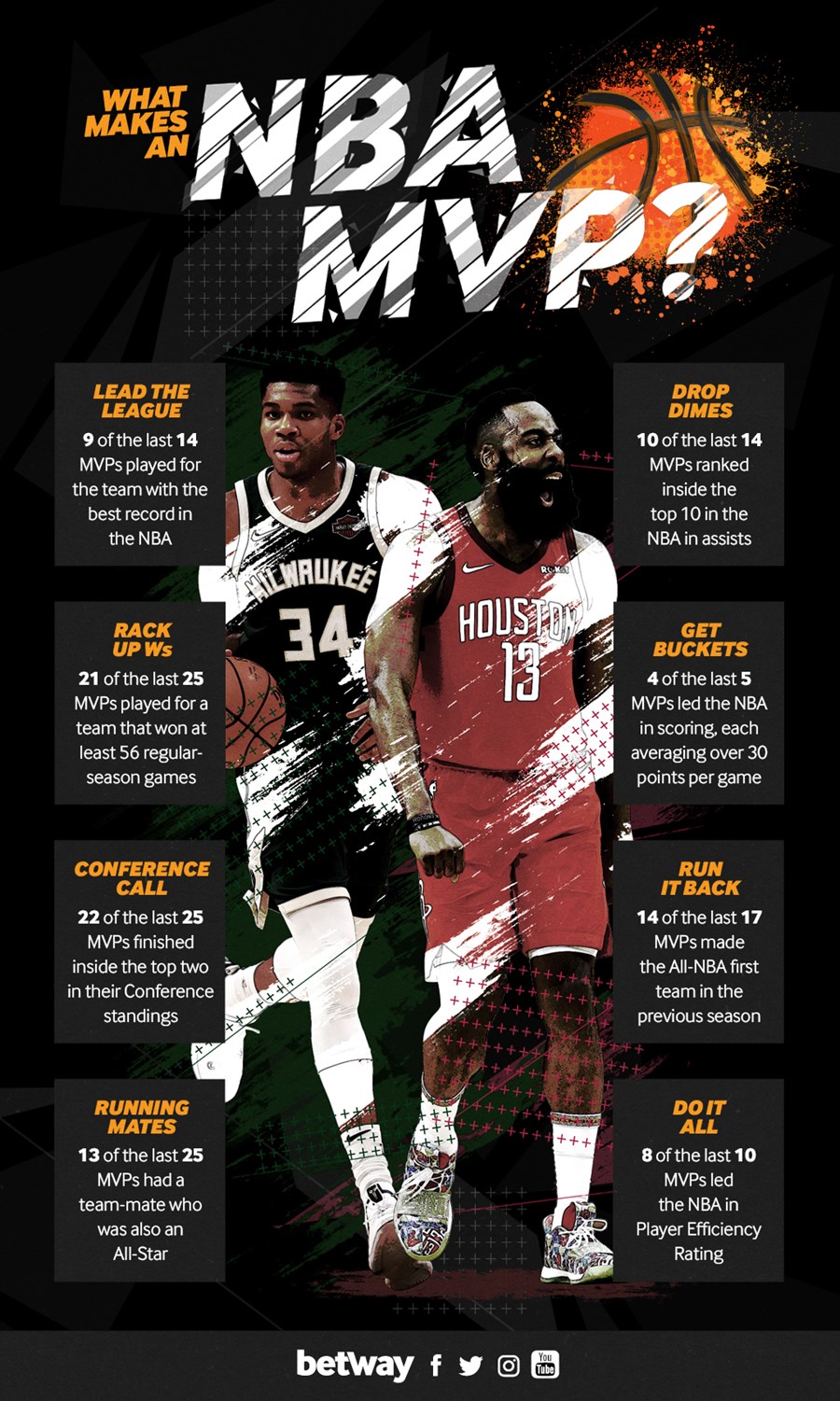What makes an NBA MVP?

This season's race is the closest in years, but a look back at the history of the award reveals what really matters to MVP voters.
The NBA’s MVP should be awarded to the best player in the league.
Unless it’s the most important player for the league’s best team. Or the star with the most impressive individual statistics. Or the one whose team would be the most affected by his absence.
Let’s face it – the MVP race is hugely subjective, with the definition of what truly makes a player ‘valuable’ seeming to change every year.
That’s particularly true this season, with Giannis Antetokounmpo the narrow sports betting favourite over James Harden in what will likely be the closest vote in years.
Whether Harden’s offensive brilliance makes him more influential than Antetokounmpo’s all-round game is up for debate, but a look back at the history of the award reveals what really matters when it comes to deeming who is the MVP.
Scoring is a good place to start.
Being the league’s top scorer hasn’t historically been a prerequisite for an MVP, but that has changed in recent years.
Four of the last five winners led the NBA in points, all of whom averaged over 30 per game.
It’s not all about putting up points, though.
Getting team-mates involved has become much more important in the past decade, with eight of the 10 MVPs since 2008 having ranked inside the NBA’s top 10 in assists.
It follows, then, that while centers and power forwards dominated the award in the 1990s and early 2000s, it’s now guards and ball-dominant forwards who receive most of the votes.
Seven of the 11 MVPs between 1993 and 2004 ranked inside the top 10 in the NBA in rebounds, but just one has reached that mark since then: Russell Westbrook – a point guard – in 2017.
While the MVP is supposedly a single-season award, it is rarely handed to a player who hasn’t been one of the best players in the league for a sustained period.
Of the last 17 MVPs, for example, 14 had been voted into the All-NBA first team in the previous season, and all 14 were coming off a top-four finish in the MVP voting.

Over the past decade, one individual statistic has been the clearest indicator of who will be the NBA’s MVP: Player Efficiency Rating.
This advanced metric, developed by the Memphis Grizzlies’ executive John Hollinger, boils down all a player’s statistics into a single number.
Of the past 10 MVPs, eight led the league in PER.
As important as statistical brilliance is, though, the team you play for is ultimately crucial.
Being part of the best team in the NBA is a major factor, with seven of the last 10 winners having played for the team with the league’s best record.
Of the last 15 winners, 11 topped their conference at the end of the regular season, with just three of the last 25 MVPs winning fewer than 54 games (one of which was Karl Malone in the lockout-shortened 1998/99 season).
It’s for that reason that Antetokounmpo has a major edge in this year’s race.
The seven-footer – who also happens to lead the league in PER – is clearly the best player for the Milwaukee Bucks, who won 60 games this season, three more than any other team.
Winning more games than the Golden State Warriors puts Antetokounmpo at a major advantage over Harden, whose Rockets won 53 games, finishing third in the West and fifth in the NBA.
Harden’s statistical excellence is clear – he led the league in scoring in the regular season with 36.1 points per game and also ranked seventh in assists – but Antetokounmpo has also put up great all-round numbers and has the added edge of playing for a superior team.
The debate will continue up until – and even beyond – the NBA awards, but, if history is anything to go by, the voters will almost certainly go with the Greek Freak.





































